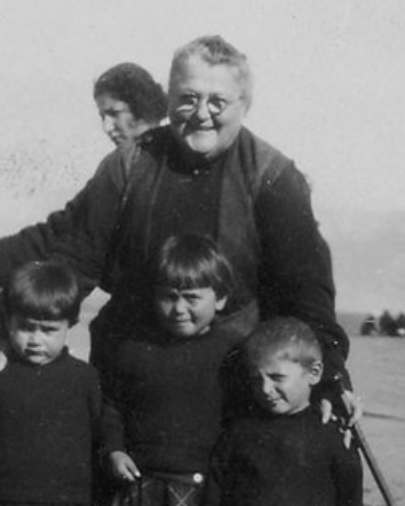Emma Darling Cushman - Nurse, Missionary, and Hero
Humanitarian Nurse
Born: 1863, Burlington, New York, U.S.A.
Died: 1930, Cairo, Egypt
Emma Darling Cushman was a courageous nurse and missionary who saved thousands of Armenian orphans during World War I and dedicated her life to protecting vulnerable women and children.
Emma was born in 1863 in Burlington, New York, during the Civil War. Her family traced its roots back to Robert Cushman, one of the leaders who helped organize the Mayflower voyage in 1620. Growing up in a time when few women received higher education, Emma pursued both teaching and nursing. She first worked as a teacher, then trained as a nurse at Patterson General Hospital in New Jersey. After earning her credentials, she served as superintendent of Scarritt Hospital in Kansas City.
Will Counts was born in Little Rock, Arkansas, on August 24, 1931, the son of tenant farmers during the Great Depression. As a teen, he knew he wanted to be a photojournalist after being inspired by his high school journalism teacher, Edna Middlebrooke. His mother gave him his first camera, a Kodak Brownie Hawkeye, in his junior year.
In 1900, Emma’s life took a dramatic turn when she joined the American Board of Commissioners for Foreign Missions. She sailed to Central Turkey, where she served at the Talas Hospital in Cesarea and later at the American Hospital in Konya. For years, she provided medical care to local people, often in difficult conditions. Her dedication and skill earned her the trust of patients and coworkers alike.
When World War I broke out in 1914, the Ottoman Empire joined the Central Powers and ordered all foreigners to leave. Many left the country, but Emma refused. She believed her duty was to continue helping those in need. Remarkably, she was allowed to stay and was even granted the title of “Acting Consul of the Allies and Neutral Nations.” This meant she could act as a representative for about 17 different countries, overseeing the safety of foreign nationals, prisoners, and clergy.
Soon, a new crisis unfolded. Beginning in 1915, the Ottoman government carried out the Armenian Genocide, which killed around 1.5 million Armenians. Thousands of children were left orphaned, wandering the streets without food or shelter. Emma could not ignore their suffering. She began rescuing children one by one, hiding them in homes, basements, and any safe place she could find. When those spaces ran out, she turned the American Hospital itself into an orphanage. At one point, more than 1,000 Armenian children lived there, saved from near-certain death.
Throughout the war, Emma’s responsibilities only grew. She managed the hospital, ran the orphanage, organized prisoner exchanges, and oversaw millions of dollars in relief funds. Despite the constant dangers, she continued her work with courage and determination.
After the war ended in 1918, Emma did not slow down. She joined Near East Relief, an organization that provided aid across the region, and worked closely with the newly formed League of Nations. She focused on reclaiming orphans who had been taken into Turkish homes, returning them to their communities whenever possible. In time, more than 60,000 children were rescued by Emma and others working with her. She also established a home and school for 3,000 refugee children in Corinth, Greece, and provided special care for women and children who had suffered trauma, including those taken into harems during the war.
Emma’s humanitarian service extended beyond the war years. She aided earthquake survivors in Corinth in 1928 and even protected the orphanage during political unrest in Greece, an act that newspapers called “plucky” for a woman in her sixties.
For her lifelong dedication, Emma received many honors. Great Britain awarded her the Balkan War Medal, France gave her the Cross of the Legion of Honor, Greece presented her with the Gold Cross of the Redeemer, and Near East Relief honored her with the Distinguished Service Medal. Despite these recognitions, her name remains little known today.
In December 1930, Emma traveled to Cairo, Egypt, to spend Christmas with some of the children she had once cared for. Tragically, she died there at age 67 from an illness reported as blackwater fever, malaria, or anemia. She was buried in Cairo, but her grave is unmarked.
Emma Darling Cushman devoted her entire life to helping others, especially children left vulnerable by war and genocide. Though history has largely forgotten her, her bravery and compassion saved thousands of lives and left a legacy of hope in the face of cruelty.
References:
Emfoxwell. “Caring for Children, Prisoners, and Refugees in WWI Turkey: Emma Darling Cushman.” American Women in World War I, 6 Aug. 2023, americanwomeninwwi.wordpress.com/2015/07/27/caring-for-children-prisoners-and-refugees-in-wwi-turkey-emma-darling-cushman.
Krull, Kaylee. “Diversity Project: Emma Darling Cushman.” Life in a Jar, 14 Jan. 2020,irenasendler.org/diversity-projects/diversity-project-emma-darling-cushman.
“The Trained Nurse and Hospital Review.” Google Books, Google,https://books.google.com/books?id=2Fo9AQAAMAAJ&dq=%22cushman%22+%22official+consul%22&pg=PA114#v=onepage&q&f=true.
Keywords:
Wartime, Justice, Courage, Perseverance, Responsibility, Selflessness, Challenge Injustices, Take Risks for Others
- Collections: Healer: Generosity, Spotlight Heroes 2026, Unsung Heroes, Wartime Unsung Heroes

